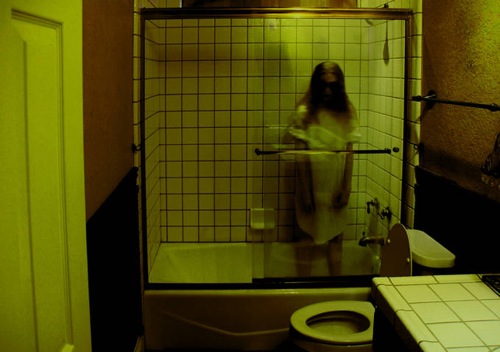Discovered on the Internet and known as a storyteller with a unique vision, writer and producer Daniel Knauf, best known as the creator of “Carnivàle” on HBO, has ditched Hollywood and struck out on his own to mine the field of transmedia.
With a beta project made public called “Haunted,” Knauf’s new company, BXX, is jumping feet first into the transmedia world.
Difficult to separate the plot from the technology, “Haunted” is best described as a fictional story that follows paranormal investigators working inside an abandoned house tormented by supernatural events. The storytelling format features multimedia elements such as research documentation and investigators’ blogs. Shot with multiple cameras, the project’s navigational timeline allows viewers to manipulate how they view the story.
The transmedia world is a popular one, with Sundance Institute announcing this past fall six transmedia projects accepted into its first-ever New Frontier Lab, with an impressive list of Hollywood heavyweights as advisers. In an article on Mashable, Lisa Hsia, executive vice president of Bravo Digital Media, defined transmedia storytelling as telling a story that extends across multiple media platforms. (For television, it goes beyond the on-air show.)
I spoke with Knauf to find out why “inventing a new narrative” is so important to him, what potential he sees in transmedia storytelling, and to ask him, “Why the rebel stance?” The following is an edited transcript of that discussion.
Bxx: HAUNTED Promo #1 from Daniel Knauf on Vimeo.
Q&A
Tell me about BXX (pronounced BOX) and what drew you to create the transmedia project “Haunted” for the Internet?
Daniel Knauf: Black BXX LLC is the name of our company, but we’re going by BXX now. I wanted to see if I could make a nonlinear drama work. I came up with BXX Mars about five years ago, and I did the normal thing and talked to the money people. Everyone said, “This is interesting. Can we make a TV show out of it?” It’s the first place they go.
The traditional entertainment industry is not known for their humility. They tend to think they are the end all. You don’t take a TV show and put it on Hulu and call it Internet content. No, it’s not. It’s a TV show you’re watching on your computer. Hulu’s not really Internet, Funny or Die is not really Internet; those are just TV being watched on a different screen. For me, I wanted to invent a narrative that there was absolutely no way you could have done it if the Internet wasn’t invented. That was the goal I set myself.
In the end, I just got tired of trying to convince them this lives and breathes on the Internet. I got tired of explaining finance models to them and I thought, let’s just do an inexpensive version of this and show them. I had sold “Carnivàle” off the Internet. I’ve always been into the Internet, and it stuck in my craw that the Internet wasn’t treated as the medium it could be.
But obviously money comes into play; what are the plans to monetize BXX?
Knauf: I’ve given up on Hollywood. They are too frightened. I’ve gone so far off the reservation. All I want to do is set up shop here in Nashville and build a studio and start making these things. If I had to monetize this right now, I would use surveys. I think they are the least intrusive. I don’t think I need people to watch ads every 30 seconds. I hate roll-ins, banners and pop-ups. I’d like to give people the option to subscribe and watch without surveys for a reasonable price. Choice is best.
But let’s be realistic, in order to make these things, they cost money. I’m a huge believer in capitalism, and we’ll look for people to invest in this. Money follows the eyeballs. I tried a Kickstarter for this, and I didn’t meet my goal. But when I told people they would get their money back, I got $14,000 sent to my PayPal account from total strangers in $5 and $10 amounts. They just wanted to see this thing and loved “Carnivàle” and what I do. The money will come.
Audience-building must be key to a project like this that’s outside of the Hollywood system and without its production and marketing budgets.
Knauf: I’ve built a relationship with my audience. It used to be complex for the audience and artists to connect, but that chasm doesn’t exist anymore. We have no PR. We’ve really only promoted through social networks. We had about 3,100 people sign up for early access, and we’ve had about 8,000 unique visitors. Not bad for no advertising or PR. Only 22 people put their hands on this thing. We are all artists or craftsmen. Even our CFO was pulling cable. I was driving the RV. We didn’t build sets. We shot on location. We used high-end security cameras and made certain compromises and bootstrapped it ourselves.
The actors ended up doing such an amazing job, that what was supposed to be a beta, not for the public, we decided to release to the public. We did the pre-launch because we thought it would be pretty buggy and wanted to get feedback before it went public, and two weeks later we went live. Anyone can access anything free. They do have to register if they want to unlock documents; this is so next time you log in, you aren’t locked out of documents you’ve already opened up.
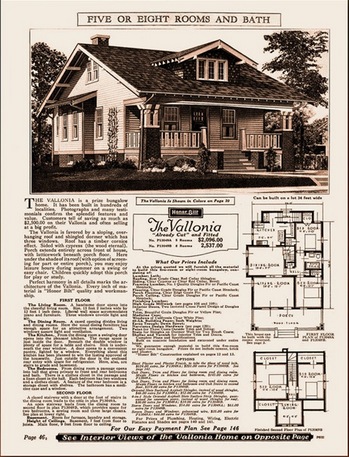
About 30 percent of people who visit spend more than a half hour, and about 12 percent spend more than an hour. I created this to engage people, so we are really happy. Strangely, the U.S.A. is the No. 1 place for hits, but Norway is second. My wife says it is because it’s where ‘Big Brother’ was invented.
Speaking of ‘Big Brother,’ there is a voyeuristic aspect of “Haunted.” It reminds me of certain forms of reality TV mixed with paranormal activity. I think the use of the security cameras amplified that feeling. Can you talk about that?
Knauf: There is a voyeurism quality. Even a good movie feels voyeuristic or (like) a stage drama. What’s interesting is, with this shooting schedule, you’re not just watching actors acting. You’re watching actors living. There was no off-stage. We had cameras in the bathroom. When we said ‘action,’ we didn’t say ‘cut’ for 32 hours. There is a certain level of reality that occurs in that situation. We directed in shifts, and there is still some footage I haven’t seen.
My partner, at about 26 hours, said, ‘You gotta come in and watch these people.’ I would say they were experiencing some kind of incipient post-traumatic stress syndrome. They were zombie-fied and behaving oddly. The location was like a spook house with sound effects and things falling and crashing. There isn’t a big difference between being an actor pretending to be attacked by a haunted house and being a person being attacked by a haunted house. It was a traumatic event for them, and I ended up cutting about eight hours off the shoot.
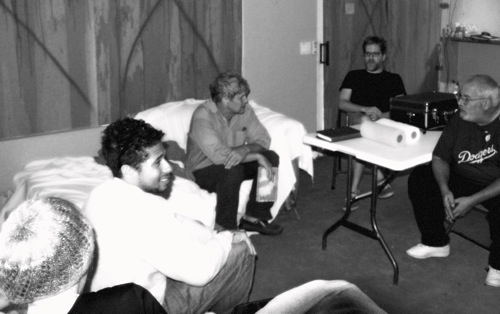
What about the tech part, the security camera vibe and ability to track the characters’ movements throughout rooms? How does this factor in, and where do you see this going?
Knauf: I’m used to copywriting everything, but now I get patents and I feel like Thomas Edison. It’s really cool, like I’m an inventor or mad scientist. The hardest thing when we are explaining ‘Haunted’ is the easiest thing when you get on and play with it. People ask, ‘How do I watch this? What if I make a mistake?’ It doesn’t matter. You can’t do it wrong. I tell people just watch it, and you’ll see how natural it is. Nothing is more artificial than a three-act structure. They don’t exist in nature. What you find when you play with ‘Haunted’ is you are accessing it like you do your memories. Memories don’t work in a linear fashion. Memories work like we work on the Internet — something reminds us of something, that keys something, that then links to something else.
It was designed to have multiple cameras and views open. The first thing that came up was people wanted to sync them all up. I hadn’t thought about that, and we did our best to make that happen. Of course with the Internet, maintaining sync is hard unless you have a really big pipe. I would like to make it work better on tablets. We have 90 percent function. We can’t get the time slider to work on touchscreen HTML 5 yet, but we are working on it.
What I really want to do is make it so people can download these videos and cut their own movies and have a film festival. We haven’t licked that end of the coding yet, but definitely for the next one.
Is there a specific ‘event’ I can send readers to find to get a taste of ‘Haunted’?
Knauf: Saturday, Hour 5, Segment 6, Camera 1 is a good time for people to check out to see a character reacting strongly to something she is watching on camera, then they can go find which camera she is watching. Our audience has blown my mind. We have a lot of multimedia research stuff, articles and such, and they knew to go to the logs and find out when all the weird s—- happens. It didn’t even occur to me they could do that. People are so smart at figuring out all the ‘wow’ moments.
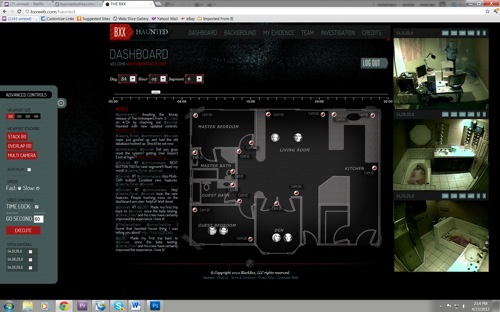
That’s clever of the audience — a true use of a multimedia project. With this under your belt, are you ready to tackle BXX Mars? What genres of storytelling do you see as lending themselves to this format besides supernatural or horror?
Knauf: BXX Mars is the next one we’re doing. It’s about a group of astronauts facing being marooned. They have a short launch window they have to make or be stuck on Mars. BXX Mars will be 72 hours. I’d love to do BXX Niagara about a honeymoon hotel. A family reunion would work, too — any story that Robert Altman would have done. This whole thing is character-driven. We could follow people in a shelter in a hurricane like Katrina or track a firefighter on 9/11 — or BXX Whitechapel and set up the East End of London and have the actors living that role for a 12-hour period.
How do you decide the length of time to cover?
Knauf: The length of the event isn’t as important as how we are covering it. One isn’t directing in a traditional sense — more like cuing events to poke the actors with a stick. It’s a marathon for an actor. I’m not willing to hurt people to deliver entertainment. The next one, the actors will really have time to train, especially when we aren’t on location but on sets. You could technically call a cut or shoot an insert, but the problem is it feels totally false. There is a level of reality in these performances that exist only in this format. Even voices change in tone depending on whether one is tired or scared. It is impossible to duplicate.
There is a strength in the performance from the actors being in character for so long. The actors had to change how they act. I had to change how I write. Everything changed. It turned out to be a surprising way to tell a story. They wake up in character and cook a corn dog in character. It leads to some real moments. We connect with the quiet moments. That’s where drama lives. This format really delivers that.
MS: So is this goodbye to Hollywood?
Knauf: What has really burned me out on Hollywood is since I did ‘Carnivàle,’ I have a stack about 11 feet tall of material, and maybe 18 inches of it has landed on eyeballs. I didn’t get into the business to write for half a dozen studios executives. I’ve been paid well for the 11 feet, but that’s not why I do this. I do this because I am paying forward for every writer that inspired me. If my stuff isn’t landing on eyeballs, then I’ve failed at that. In Hollywood, they are always teetering on the brink of saying no for 1,000 reasons. With BXX, I can create huge amounts of content for peanuts in Hollywood terms. I can create 1,500 hours of content for under a million dollars. This is potentially very profitable, and I can take those profits and do standard productions as well.
BXX Mars will create 1,600 hours of footage. I could easily cut a mini-series out of that for TV. What’s cool is once everything is set up, I can bring in an American cast and then bring in a Chinese cast and do it all over again. It is so cross-platform. Everything follows the Internet because the Internet embraces every medium.
And everything you do is yours as opposed to working within the Hollywood system and selling rights. Is that a motivating factor?
Knauf: My big bugaboo with Hollywood is copyright. If you open a Stephen King book, it is copyright Stephen King. If you watch ‘Carnivàle,’ it is copyright HBO. The only reason for that is they are pigs. There’s only five or six of them, and they know they have to stick together. It’s like a cartel and so against antitrust laws. I want to create a studio where if someone wants to make something at my studio, they get to retain their copyright. It will never be ‘copyright BXX.’ That’s my pipe dream. We would be what Random House is to Stephen King — we would publish that person’s work. Why would I pirate someone’s intellectual property just because I’m the one with the money? It’s disgusting the way Hollywood treats artists. Everyone’s convinced we are always on the bubble of being fired at all times. The town runs on flop sweat. ‘Everybody will never work again.’…There is so much fabulous material that didn’t move forward because of Hollywood timidness.
People ask why there isn’t anything good on TV. I’m coming from the inside, and I’m telling you that not only do they think the audience is an idiot, to the point where they think you can’t feed yourself, but they loathe you, too. They hate the audience because they can’t figure out why they watch what they watch. I’ve read somewhere that the odds of a show succeeding is about the same as they were in the ’60s. Things fail now because they are exactly like 10 other things on TV.
I think we are going to have another renaissance. My showrunner friends listen to me being a mad prophet, and they are amazed: ‘You do whatever you want to do? No one tells you what you have to do!?’ I think when people realize the gates are open and no one will shoot them when they step out, things are going to change.
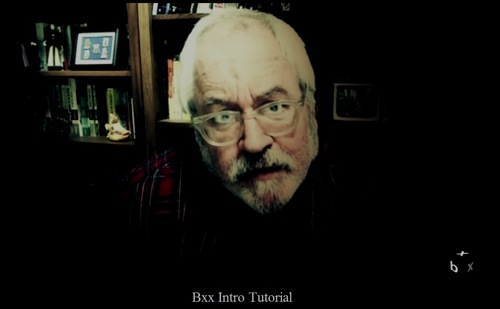
Technology is definitely pushing storytelling to new limits. As writer and blogger Chuck Wendig wrote on transmedia, ‘It makes me feel like I’m from the future. In the end, though, whether you call it transmedia or cross-media or new media or hybridized-story-pollination (HSP), it’s still just storytelling. Though it’s storytelling in a bigger, sometimes weirder, way.’
Amanda Lin Costa is a writer and producer in the film and television industry. She writes a series called “Truth in Documentary Filmmaking” and is currently producing the documentary, “The Art of Memories.”
